
Hirsutism is a medical condition involving the excessive abnormal facial and body hair growth of women. The hair tends to be dark and coarse, and women with the condition tend to produce abnormally high levels of male sex hormones, or “androgens,” from their adrenal glands and ovaries, according to the University of Maryland Medical Center. Women with hirsutism tend to grow hair on their upper lip, abdomen and breasts, typically exhibiting male-pattern hair growth. The herbal treatments for hirsutism help to correct the hormonal imbalance that causes the condition.
Black Cohosh
Black cohosh, a popular herbal remedy for menopause symptoms, can help to treat hirsutism. Black cohosh has estrogen-like effects in the body and helps to optimize estrogen levels, promoting hormone production when estrogen is low, according to the Herb Growing & Marketing Network. The herb has “anti-androgenic effects,” meaning that it combats excessive testosterone in the body, notes the University of Maryland Medical Center. To treat hirsutism, the University of Maryland recommends taking 20 to 40 mg twice daily of standardized black cohosh extract.
Chaste Tree
Taking chaste tree extract can also help to treat hirsutism by regulating hormone levels in the body. Like black cohosh, chaste tree supplements have anti-androgenic effects, states the University of Maryland Medical Center. Hormone-like substances found in chaste tree berries and seeds help to correct imbalances in female hormones and increase progesterone levels, according to the Herb Growing & Marketing Network. The University of Maryland advises taking 20 to 40 mg of chaste tree standardized extract each day before breakfast to treat hirsutism.
Saw Palmetto
Taking 160 mg twice daily of saw palmetto standardized extract can additionally help to treat hirsutism, according to the University of Maryland Medical Center. Saw palmetto extract helps to suppress male hormones and is sometimes even used to treat polycystic ovary syndrome, a condition often associated with hirsutism. “A hexane extract of the berries has been shown to have anti-androgenic properties through a direct action on the estrogen receptors and by inhibiting the enzyme testosterone-5-alph-reductase,” the Herb Growing & Marketing Network says.
Spearmint Tea
Spearmint tea is a common traditional remedy for fevers, headaches and digestive disorders. New preliminary medical studies indicate that also spearmint tea may equally be effective in treating hirsutism. Medical researchers have found that women suffering from hirsutism who drink spearmint tea reduced the amount of free testosterone in their blood, which may also reduce hirsutism symptoms in mild cases, says the University of Maryland Medical Center. The University of Maryland recommends drinking 1 cup of spearmint tea twice daily to treat hirsutism symptoms.
Related Articles

Can Drinking Nettle Tea Reduce DHT ...

Recommended Daily Dosage of Saw ...

Golden Flax Seed Vs. Dark Flax Seed
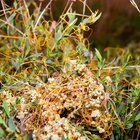
Traditional Uses of Cuscuta

Can Herbs Flush Cellulite?

Pycnogenol and Acne
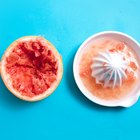
Grapefruit Extract for Eczema

Burdock Root for Acne

What Are the Benefits of Ashwagandha in ...

How to Eat Fenugreek

Chasteberry for Acne

Chemicals That Stop Testosterone ...

L-Lysine for Hair Growth

Wild Yam for Hair Growth

Estrogen in Skin Creams
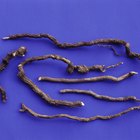
Benefits of Indian Sarsaparilla
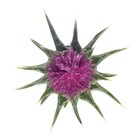
Does Milk Thistle Lower Liver Enzymes?
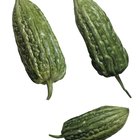
Bitter Melon for Acne

Anise Seed Cautions and Side Effects
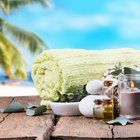
The Benefits of Castor Oil Packs
References
Resources
Writer Bio
Sarah Terry brings over 10 years of experience writing novels, business-to-business newsletters and a plethora of how-to articles. Terry has written articles and publications for a wide range of markets and subject matters, including Medicine & Health, Eli Financial, Dartnell Publications and Eli Journals.
Photo Credits
fresh growng mint, white background image by Tamara Kulikova from Fotolia.com